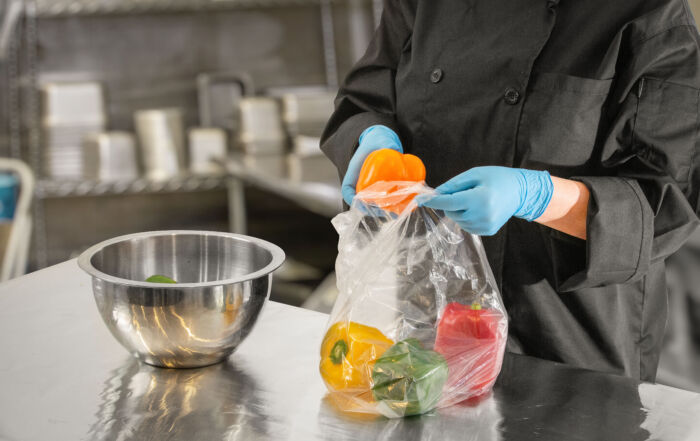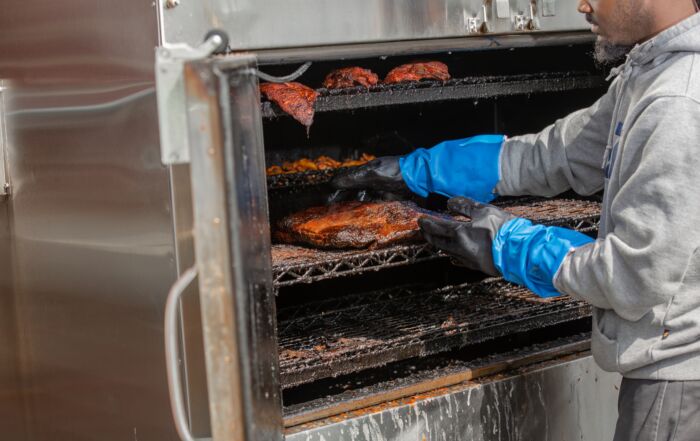Preventing Norovirus in your Foodservice Operation
Norovirus is one of the leading causes of vomiting and diarrhea in the United States, causing between 19 and 21 million illnesses each year. These illnesses result in over 100,000 hospitalizations.
Our foodservice colleagues in certain facets of the industry, such as schools, daycares, healthcare, and cruise ships are particularly susceptible to having to deal with norovirus outbreaks. But norovirus could impact all of us, regardless of how many people we serve or how big our teams are. The good news is that norovirus is highly preventable with proper food safety practices.
First, a bit of background on norovirus and why it is so contagious. As you likely guessed, norovirus is a virus that causes gastrointestinal illness, including vomiting, diarrhea, nausea, and stomach pain. It spreads easily through contaminated food, water, surfaces, and even person-to-person contact. Most cases of norovirus are transmitted through the fecal-oral route. Unlike some bacteria, norovirus can survive on surfaces for days and is resistant to many common disinfectants. Norovirus also spreads easily, with some research noting that from the point of impact of a vomit incident, the virus can spread 25 feet beyond that area. These factors make prevention of norovirus extremely difficult, and thus strict hygiene measures must be implemented to control the spread of the virus.
Handwashing is the single most effective way to prevent norovirus. Remember the basics of proper hand hygiene. Wash hands thoroughly with soap and warm water for at least 20 seconds before preparing or serving food, after using the restroom, and after any activity that could contaminate hands. While alcohol-based sanitizers may be helpful to prevent some viruses, they are ineffective for norovirus.
If you’ve been on a cruise ship recently, you may have noticed all the signs leading to the cafeteria that ask you to wash or sanitize your hands before proceeding through the buffet. Practicing good hand hygiene is one of the best things you can do to keep yourself healthy. If you are in a school, enlist the assistance of teachers and other staff in the front of the cafeteria to encourage students to wash their hands before going through the lunch line.
……[norovirus] spreads easily through contaminated food, water, surfaces, and even person-to-person contact, mostly through the fecal-oral route……
Norovirus spreads rapidly through infected individuals. Any staff showing symptoms of vomiting or diarrhea must stay home for at least 48 hours after symptoms resolve. Schools should also have policies to prevent ill students from handling food or sharing utensils, as even a single infected person can trigger an outbreak.
As previously noted, norovirus can survive on surfaces for days, so regular cleaning and sanitizing are essential. Use approved disinfectants effective against norovirus on food contact surfaces, counters, tables, and cafeteria trays. Clean spills of vomit or diarrhea immediately using gloves, disposable towels, and proper disinfectants. Wash and sanitize dishes, utensils, and cookware thoroughly, preferably in a dishwasher that meets proper temperature requirements.
Since norovirus can be transmitted via contaminated food, strict food handling practices are crucial. Avoid bare-hand contact with ready-to-eat foods; use gloves, utensils, or deli tissue.
Preventing norovirus is only possible if staff understand the risks and protocols. Training should cover proper handwashing and glove use, procedures for cleaning and sanitizing surfaces, policies for reporting illness, and the basics of safe food handling, storage, and preparation practices.
Even with the best prevention measures, outbreaks can still occur. Have a clear response plan if a vomiting or exposed diarrhea incident does occur. This should include isolating the contaminated area and ensuring thorough cleaning and sanitizing before resuming operations.
Norovirus outbreaks can have serious consequences, from widespread illness to disruptions in operations. However, with strict hand hygiene, exclusion policies for sick staff, proper cleaning and sanitizing, safe food handling, and staff training, the risk can be drastically reduced. Risk Nothing.
READ MORE POSTS
Preventing Norovirus in your Foodservice Operation
Norovirus is one of the leading causes of vomiting and diarrhea in the United States, [...]
Safe Handling of Leftovers in Foodservice Operations
In any foodservice operation, leftovers are inevitable. After managing a family-style restaurant, where all-you-can eat [...]
Turn your Health Inspector into your Food Safety Ally
For many foodservice operators, keeping up with evolving regulations can feel like chasing a moving [...]
Time and Temperature: Why 41°F to 135°F?
In one of my last blogs, I mentioned the temperature danger zone, or TDZ, as [...]










